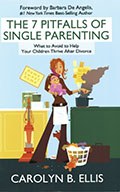
By Carolyn Ellis
Divorce is a major cause of stress. Becoming divorced rips through the entire fabric of your life. It affects you not only emotionally, but financially, socially, and in some cases, professionally and geographically as well. Coping with divorce by learning how to take care of yourself in the midst of stress is important not just for yourself, but for your children as well.
Divorce and Stress
The Social Readjustment Rating Scale, developed by Miller and Rahe, ranks various life changes with a point scale according to level of stress. A score below 125 means you’re at low risk of stress. A score above 300 puts you at a high risk of stress and potential illness. Just take a look at some of the stress factors that can be involved in a typical divorce:
| Example of Factors in a Typical Divorce | |
| Divorce | 96 points |
| Major change in living conditions | 42 |
| Change in family get-togethers | 25 |
| Major change in health or behavior of family members | 55 |
| Major decision about immediate future | 51 |
| Decreased income | 60 |
| Major change in sleeping habits | 26 |
| Major change in usual and/or amount of recreation | 28 |
| ____ | |
| TOTAL STRESS POINTS | 383 |
In this example, this “typical” divorce easily racked up 383 points. That’s well over the 300 threshold points considered to put you at risk of stress-related illness! This puts into perspective what a huge impact divorce can have on your health and wellness and how important it is for you to get the resources and the support you need to cope with this upheaval. For people who face threats to their physical safety, this support might include help from lawyers, the courts, and the police.
Put Your Own Oxygen Mask on First
Think about the safety announcements you hear in airplanes, advising adults to put the oxygen masks on themselves first and then assist their children. If you have passed out from lack of oxygen at 30,000 feet, what good will you be to your children in that state? The same principle applies in divorce. You must be aware of your own needs and take responsibility for taking care of yourself. Your commitment to self-care is one of the most important gifts you can give yourself—and your children. When single parents let their own reserves get low, they are more likely to struggle with coping with divorce and leak emotional toxins all over their children.
Here are five simple self-care strategies to get the ball rolling.
1. Give yourself five minutes a day
Self-care doesn’t have to be big, fancy, expensive or time-consuming. Even just taking 5 uninterrupted minutes a day to yourself can make an enormous difference. Read a book, do some conscious breathing or watch the clouds moving across the sky can help lower stress.
2. Find emotional support
Connect to people who can understand and support you in your divorce journey. Talk to an experienced divorce coach or therapist. Look online or in your local paper to see if there are any support groups in your neighborhood. Friends and family can help too, but choose wisely to find someone who will help you move beyond blame and anger so you can heal.
3. Delegate as much as possible
Are there any responsibilities that you have now that you may need to delegate or defer to give yourself some time off? Add names to your babysitter list or consider doing a child-care swap. Ask for help.
4. Appreciate yourself
Acknowledgment is a healing balm to our soul, letting us know that we are doing the best we can with the tools we have. Celebrating your daily successes is so important. Take the time to appreciate yourself for who you are and how far you’ve come, and it makes the divorce journey so much smoother.
5. Be a role model for your children
Human beings have a huge emotional range that encompasses joy and creativity on one end of the spectrum and overwhelm and anger on the other. You can model to your children how to handle all of their emotions, not just the socially acceptable ones. Start by simply naming your feelings. Let your children know “Mommy is feeling overwhelmed right now,” or “Daddy is kind of scared.” Help your children build their own emotional vocabulary.








